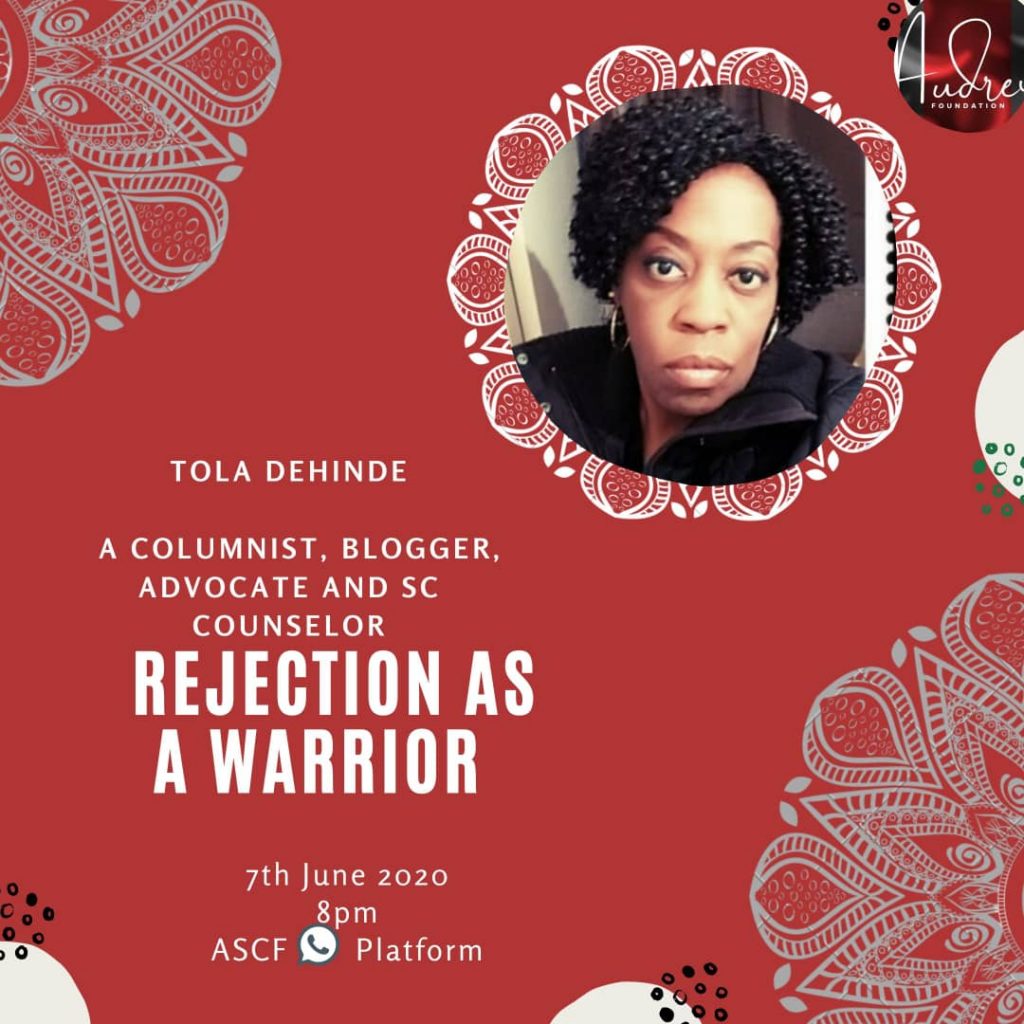REJECTION WITH AUNTY TOLA DEHINDE
Compiled By Imo Hannah
Published By Audrey Mukoro

REJECTION AS A WARRIOR BY TOLA DEHINDE ON ASCF WHATSAPP GROUP 7/6/2020
Who’s ready?????
If you are online pls indicate with an emoji
Good evening everyone
Our guest is here with us now, she is our mama, an advocate, a columnist and a warrior welcome ma
Thank you for the invitation Audrey
Are we all ready to learn about SCD & rejection?
People with SCD suffer from rejection on so many levels and that is what I want to talk about today. First of all, let me start by explaining what rejection is: Rejection can be defined as the act of pushing someone or something away.
One may experience rejection from one’s family members, a friend, or a romantic partner, a job, and the resulting emotions can often be painful. Rejection can be experienced on a large scale or in small ways in everyday life. While rejection is typically a part of life, some types of rejection may be more difficult to cope with than others.
People who suffer rejection, suffer from the frequently followed by emotions such as hurt, jealousy, loneliness, shame, guilt, social anxiety, embarrassment, sadness, or grief. These are feelings people experience when they are not accepted by others.
While any rejection can be painful, some instances of rejection may be more impactful than others. Because most humans desire social contact, and many people crave acceptance from society, being rejected can incite negative feelings and emotions. A person might feel rejected after a significant other ends a relationship. A child who has few or no friends may feel rejected by peers.
PSYCHOLOGICAL EFFECTS OF REJECTION
Rejection can be extremely painful because it may have the effect of making people feel as if they are not wanted, not valued, or not accepted. Most individuals will experience rejection at some point in their lives. A child who is constantly sick may feel rejected temporarily by a busy parent, or a sickly student may feel rejected by a professor who is not sympathetic when it comes to handing in assignments late. Ongoing or long-term rejection may have deep and lasting psychological effects which may include:
Trauma: Long-term rejection from loved ones for example, may contribute to trauma and can have serious psychological consequences. For example, children who feel consistently rejected by their parents may find it difficult to succeed at school and in relationships with their peers. Some individuals develop a chronic fear of rejection, often as a result of multiple traumatic experiences with rejection early in life.
Depression: Rejection has been linked to the development of depression. Further, bullying, (which a lot of people with SCD have experienced in school) which is essentially a combination of ostracism and rejection, can have numerous negative effects, including depression, stress, eating disorders, and self-harming behaviours.
Pain response: Research has shown that the brain responds to social pain in a way that is similar to the way that it responds to physical pain.
Anxiety and stress: Rejection might often contribute to conditions such as stress and anxiety. Similarly, these and other mental health conditions can exacerbate feelings of rejection.
While rejection can hurt, it’s never healthy to take the pain of rejection out on another person through emotional abuse or physical violence. One study found, for example, that perceived rejection may contribute to violence or aggression against loved ones. As people with SCD, because of the various rejection that we suffer, sometimes, we snap and shout at those who are closest to us. Let’s look at types of rejection.
TYPES OF REJECTION
Rejection occurs in a variety of contexts. Some common types of rejection include:
· Familial rejection: Rejection from one’s family of origin, typically parental rejection, sibling rejection, family member rejection may consist of abuse, abandonment, neglect, or the withholding of love and affection. This form of rejection is likely to affect an individual throughout life, and it may have serious consequences.
· Societal rejection: This type of rejection may occur at any age and can often begin in childhood. Social rejection can include bullying and alienation in school or the workplace, in the community, but it can also extend to any social group.
Rejection in a relationship: People may experience rejection while dating or in a relationship. For example, an individual may refuse to share an experience with a partner, withhold affection or intimacy, or treat a partner as if that person were no more than a casual acquaintance. When an individual decides to end a relationship, this can also cause the other partner to feel rejected.
Romantic rejection: Rejection can occur when a person asks for a date and is denied. Romantic rejection can be particularly challenging, especially to individuals who desire a romantic relationship. A breakup, or rejection from a romantic partner, can lead to feelings of grief that may be overwhelming and can last for weeks, months, or even years. Rejection in a romantic relationship might alter the way one views one’s life and one’s own self long after the breakup has occurred. All forms of rejection can hurt, and when the rejecting is done by a trusted loved one, it can deeply impact self-worth and self-confidence.
Pls note that rejection in a relationship or rejection a romantic setting are different.
The first could be a business partner, team member etc…
People who suffer from rejection, suffer from rejection sensitivity.
What Is Rejection Sensitivity?
This is an area where people with SCD need to be aware of because while no one enjoys being rejected, some people are more sensitive to social rejection than others. Individuals who are high in rejection sensitivity are so fearful and indifferent to rejection that it impacts their daily lives. These people expect to be rejected all the time. And as they anxiously look for signs that someone doesn’t want to be with them, they often behave in ways that push other people away. This behaviour creates a painful cycle that can be difficult to break.
Signs
Individuals with high rejection sensitivity constantly look for signs that they’re about to be rejected. They tend to respond dramatically to any hint that someone doesn’t want to be with them. Because of their fears and expectations, people with rejection sensitivity tend to misinterpret, distort, and overreact to what other people say and do. They may even respond with hurt and anger.
Causes
Childhood experience: Early experiences of rejection, neglect, and abuse may contribute to rejection sensitivity. For example, being exposed to physical or emotional rejection by a parent, may increase the likelihood that someone will develop rejection sensitivity. However, the rejection doesn’t always need to be direct to have an impact. Growing up with a parent who is emotionally unavailable or highly critical, also can cause someone to develop a strong fear of rejection in other relationships. Rejection sensitive children also are more likely to behave aggressively, according to a study published in Child Development.

Rejection sensitive people respond to life in a way that is meant to protect them from pain. Unfortunately, their behaviours often backfire. A rejection sensitive person’s fear of being rejected causes them to struggle to form new connections and to undermine their existing relationships. Furthermore, a rejection sensitive individual may become angry and hostile whenever a friend doesn’t respond to their invitations in a timely fashion. Ultimately, that may cause the friend to retreat even more, which increases the sense of rejection. Meanwhile, others with rejection sensitivity may avoid all situations and relationships where they might be rejected. Consequently, they may feel extremely isolated and lonely—which essentially leads to their biggest fears coming true.
Effects on Adults
Adults with rejection sensitivity who are in romantic relationships will likely experience ongoing relationship problems. They often misinterpret events and reactions because they’re hyper-vigilant about being rejected. These behaviours may lead to irrational jealousy because the individual is terrified of being abandoned or rejected. They also might interpret other behaviours, such as a partner being preoccupied with work, as proof that the other person is no longer in love with them.
For men with rejection sensitivity, being in a committed relationship may be more helpful to them than it is to women. One study found that men are lonelier and more rejection sensitive when they’re not in a romantic relationship.
But women who rank high in rejection sensitivity aren’t likely to experience relief from being in a relationship. They may continue to feel just as lonely and fearful of rejection when in a relationship as compared to when they are alone. Both men and women who fear rejection struggle to establish close romantic relationships. Their efforts are frequently directed toward avoiding conflict and rejection rather than establishing intimacy and growth. So people with SCD, please watch out and be aware of how to react and respond to issues.
If one is rejected on so many levels, it will affect one psychologically
Link to Mental Health Problems
Rejection is a serious matter as rejection is a direct threat to an individual’s sense of belonging and can have serious consequences on mental health. Even if someone isn’t actually being rejected all the time, if they perceive that they are an outcast or if they believe that they are being rejected, their mental health is still likely to decline. Furthermore, researchers discovered a link between rejection sensitivity and suicidal thoughts in psychiatric patients. The researchers found that individuals with suicidal imaginations were more likely to feel like they didn’t belong and they often felt as though they were a burden to others. Other studies have found that individuals who are high in rejection sensitivity are also at a higher risk of: Borderline personality disorder, loneliness and anxiety. Extreme sensitivity to rejection is also part of the defining criteria for avoidant personality disorder and social phobia.
In life, people will only help you when they see you helping themselves.
Coping Strategies
In fact, research suggests that self-regulation, which involves monitoring and controlling one’s emotional and behavioural responses, may be the key to coping with rejection sensitivity. For instance, when you perceive a potential sign of rejection, it may help to stop and reflect on the situation rather than responding immediately. One way to do this is to look for alternative explanations for the behaviour instead of assuming the worst. If you’re unable to make these changes on your own, you may need to enlist the help of a counsellor.
It can be scary to take steps to grow closer to someone because the deeper the relationship grows, the more the thought of being rejected could hurt. But learning how to build deeper, healthier connections is key to reducing loneliness and isolation.
Rejection sensitivity is not something you should ignore. In fact, symptoms often worsen over time if they’re left untreated. Consequently, if you’re prone to overwhelming emotional reactions including intense anger, anxiety, and sadness when you feel criticised or rejected, talk to a counsellor. Learning to address your sensitivity and respond more appropriately to rejection is the key to improving your overall quality of life.
Revive Your Self-Worth
When your self-esteem takes a hit it’s important to remind yourself of what you have to offer (as opposed to listing your shortcomings). The best way to boost feelings of self-worth after a rejection is to affirm aspects of yourself you know are valuable. Make a list of five qualities you have that are important or meaningful — things that make you a good relationship prospect (e.g., you are supportive or emotionally available), a good friend (e.g., you are loyal or a good listener), or a good employee (e.g., you are responsible or have a strong work ethic). Then choose one of them and write a quick paragraph (write, don’t just do it in your head) about why the quality matters to others, and how you would express it in the relevant situation. Applying emotional first aid in this way will boost your self-esteem, reduce your emotional pain and build your inner strength.
As social animals, we need to feel wanted and valued by the various social groups with which we are affiliated. Rejection destabilises our need to belong, leaving us feeling unsettled and socially unleashed. Therefore, we need to remind ourselves that we’re appreciated and loved so we can feel more connected and grounded. If your work colleagues didn’t invite you to lunch, grab a drink with members of your church instead. If your kid gets rejected by a friend, make a plan for them to meet a different friend instead and as soon as possible. And when a first date doesn’t return your texts, call your grandparents and remind yourself that your voice alone brings joy to others.
Self-love
Love is the very essence of life. It doesn’t have to be earned, you don’t have to wait for someone to give it to you, and you can never be found worthless of it. Love is never in short supply. It is abundant, inexhaustible, easily accessed and Free! Love yourself, you are lovable; get rid of your mental bad habits, and counter unhealthy beliefs with healthier ones
Acceptance
Make a conscious effort to accept the vessel you were born into, not as a limiting factor in your life, but as an ally. When you come to accept the present circumstance as it is and realise that the past is behind you, you’ll feel the power you have now, in this present moment, to consciously architect your future. This will help you stop judgements of right and wrong about your past, your parents, or who you are, and ease into acceptance of what is present in the here and now.
Rather than fighting your natural impulses because you fear what others will say or think about you, you’ll learn to accept your desires as they are. Once you accept yourself, you become mindfully aware of your human tendencies and can heal your wounds and reclaim your perfection.
Accountability
Next, aim at thriving. It’s up to us to create a life we love. Accountability shifts the ownership and stewardship of our life back to us. This can be terribly frightening and tremendously freeing. You are free to create a written description of the you that you desire or intend to be. You may consider this your ideal self, if you like. This version of you may not be perfect or flawless, but this version of you lives an authentic life and is fully aligned with your personal values, motivations, and ideals.
Accountability is the process of taking personal responsibility for your life without guilt, shame or “pity parties” and move on to creating a life you’ll love. It may be scary to no longer assign blame on others, and just realising that your future is your total responsibility. This may fill you with a heavy sense of dread, but know this, you can and will get past this fear. And soon you will re-experience the childlike wonder and joy of having a world of possibilities open to you.
Actions to counter rejection
Affirmation: Use your words to build yourself up; positive self-talk, be your biggest cheerleader.
Service: Give yourself to help other when you can; service is a higher power.
Time: Spend time on the things you love.
Gifts: Invest in yourself; spend money on perfecting your crafts, education, training and vocation.
Touch: Don’t suffer in silence, talk to people, an aunty, a friend a counsellor in church etc…
God: Whatever your belief system is, dig deeper into God
Words of Affirmations – Use these words to build yourself up because your words have power
I know who I am, I have value and worth, I acknowledge my own self-worth; my confidence is soaring; I am not a mistake; I accept myself unconditionally; I am a beautiful person; I deserve love, compassion & empathy; I believe in the person I dream of becoming; I choose to be happy; I choose faith over fear. Positivity is a choice; I choose to be positive; I am at peace with who I am. I matter and I am allowed to say ‘no’ to others and ‘yes’ to myself. I love to learn new things; I love making new friends; I can do anything I set my mind to; I am smart and make good choices. I deserve good things to happen to my life. I am whole and strong; I am talented and courageous; I am loving and kind; I am doing my best. I have a voice to use; I am strong and wise. Challenges are opportunities to grow and improve. I am solution-driven, I am not afraid of obstacles. I am creative and open to new solutions. I am talented and intelligent. My happiness matters and there is no option.
Rejection is never easy but knowing how to limit the psychological damage it inflicts, and how to rebuild your self-esteem when it happens, will help you recover sooner and move on with confidence when it is time for you to show up and show out.
The End
I’ll give you all some time to read, because I know I have said a lot in writing.
I’m ready when you are with the questions.
@Tola D ma how have you dealt with it personally ma
Thanks for your question.
I have always had an inner strength and resolve about me.
I tell myself I can become whoever and whatever I want to be.
I have always had the attitude of says who?
If God hasn’t said, then I refuse the rejection of man/woman.
There’s this saying: go to where you are celebrated and not tolerated.
If I’m rejected here, I keep moving forward to where I’ll be accepted.
This thing is what makes many warriors go back in to their shell
As a Counsellor how do we handle it
Because when one has been rejected by trusted ones or people close to you.
One can become a loner as a result.
Ma
I was rejected when my ex bf introduce me to his dad and mind you his dad was a retired medical doctor
His dad refused that he dare not engaged me
I felt so bad and since then am always scared to go into any relationship
How do I overcome this ?
As a counsellor, you need to find someone you trust, that you can talk about your emotional feelings to.
Its important to talk.
Yes, I can imagine his dad being a medical doctor saying so.
Do you know why he said so?
Because he has seen so many people with SCD in hospital, some have died and some have been admitted time and time again.
So he will say no because of his prejudice.
Now in terms of how do you overcome?
You overcome by not letting a situation keep you down.
Pls read from my talk on actions to counter rejection.
Believe in yourself and what you have to offer that next person.
You are unique and wonderfully created, dust yourself and keep moving Abby.
The right person will come to you, don’t give up on love.
Rejection is part of life but of course we experience it more.
People all over suffer rejection.
It’s been a real pleasure, pls copy and star the words of affirmation; it will help your confidence.
Please ma, how can you encourage a warrior who already thinks she is not good at anything and she’s just waiting for death to come.
I would 1st of all try and get to the root of why the person feels worthless.
When we have trashed the ‘stinking’ thought out.
Then I’ll ask about what the person enjoys doing?
Everyone of us was gifted with at least a talent if not more.
I’ll then encourage the person to pursue the talent identified
And sometimes, helping in a ministry or giving your time at a NGO will help us take our focus from our personal experience and give us new opportunities and perspectives on life.
[07/06, 9:29 pm] +234 703 108 4162: You know it’s hard to encourage persons that have defeated themselves long ago, due to words from family members. But I think the method you give will work.
Thank you very much ma. May God bless you
I hear you and when I gave you strategies, it will not be a one off talk but it might take months.
Counselling takes time. When I counsel, it take anything between 8-12 weeks, it depends on how deep rooted the problem is.
Thank you all for attending and thanks Audrey for the invitation.
I wish you all well and don’t look down at yourself.
People are waiting for what you have to give or offer





Recent Comments